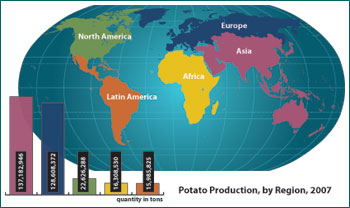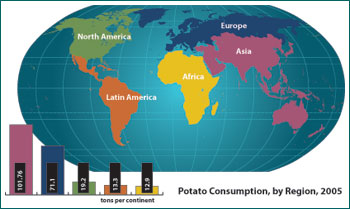SPUD TRENDS: IDAHO
Opportunities and challenges
for today’s Northwest growers
by MARY ANN REESE
OPPORTUNITIES FOR POTATO PRODUCERS lie in areas of new markets, new varieties, and new technology, Joseph F. Guenthner, internationally recognized potato economist, told participants at a recent University of Idaho-sponsored Idaho Potato Conference. Read Guenthner's entire talk.
The UI professor and researcher addressed the following topics, assuring Idaho growers and processors in attendance that “the Idaho potato industry has many bright, innovative people who will compete quite well in this environment of new opportunities.” Here are highlights. To read his entire talk, see our online magazine at info.ag.uidaho.edu/magazine/.


New markets People in all regions of the world will eat more potatoes by the year 2020. India and China alone are expected to increase annual potato consumption by 2.8 percent and 3.8 percent, respectively.
New varieties When new varieties succeed in the marketplace, a new opportunity is created. Potato varieties follow a product life cycle with four distinct stages: introduction, growth, maturing, and decline. Both seed potato and commercial potato growers can profit when they grow varieties in the growth stage. When varieties mature and begin to decline (like the venerable Russet Burbank is now), growers may switch to growth varieties.
Plant variety protection PVP allows private ownership of potato varieties. Not available when most popular U.S. varieties were introduced, proprietary rights will become increasingly important. By the end of 2005, 200 potato PVP applications were on record in the U.S, 40 percent from U.S. growers and the rest from Europe. Guenthner used Yukon Gold, a public variety, as an example. It has captured consumer interest and grown in value. When private varieties offer consumers something new and exciting, consumers will ask for it by variety name.
Supply management A cooperative movement begun in Idaho in 2005 with United Fresh Potato Growers of Idaho helps improve grower profits by controlling potato supplies during planting, harvest, or storage. Future cooperatives may choose to reduce harvested acres when plantings are too high and/or to control amounts marketed out of storage.
New technology Australia’s Technico is using its patented Technituber technology
(www.technituber.com) to change the way seed potatoes are produced and marketed. It developed a way to compress seed potato generations and provide parent seed stocks at lower costs. The firm operates around the world, including in India and China.
Genetically-modified potatoes GM potatoes were a market failure initially, but Guenthner predicts they’ll be back. He noted a “powerful drive” to accept GM crops coming from developing countries where people are hungry or starving. NGOs in Africa and Asia have taken pro-GM stances to help feed masses of people.
Contact Joseph F. Guenthner at jguenthn@uidaho.edu
|